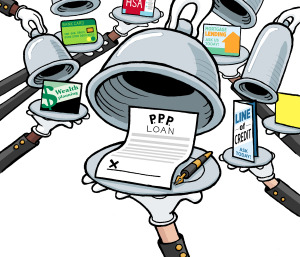
First Internet Bank finds small business is big business
With $5.6 billion in assets, Fishers-based First Internet Bank might best be described as modest in size. But in the world of small business lending, it’s among the nation’s powerhouses.

With $5.6 billion in assets, Fishers-based First Internet Bank might best be described as modest in size. But in the world of small business lending, it’s among the nation’s powerhouses.

For the first time since 2008, the Small Business Administration distributed more than 100,000 financings to small businesses, up 22% from fiscal 2023 and 50% over 2020.

The Small Business Administration warned earlier this month that it could run out of funding, given the anticipated surge in claims from Hurricane Helene.

The SBA awarded about 4 million loans worth $380 billion through the program. More than $300 billion was outstanding as of late 2023.

Experts say the hesitancy of Black business owners to borrow stems from historical neglect of those customers by traditional banks—an opinion backed by extensive historical research.

The programs are intended to help central Indiana Black business owners combat long-standing challenges in securing bank loans.

The Indiana Economic Development Corp. said the Legend Fund can help entrepreneurs and small businesses with small loans, typically under $50,000.

The IEDC said the Legend Fund will give non-traditional lenders an incentive to provide operating capital to Indiana-based businesses. Eligible lenders could have a portion of the loans they issue purchased by the IEDC, freeing up capital to support more entrepreneurs and small businesses.

The Biden administration plans to more aggressively pursue thousands of small businesses with past-due pandemic loans, reversing an earlier policy that saw the U.S. government stop short of trying to collect an estimated $30 billion in delinquent debt.

The average prime rate, or the rate banks set as a reference for customer loans, was 4%. The prime rate has more than doubled since then, hitting 8.25% in May.

All over the country, small-business owners are feeling the early consequences of this spring’s banking crisis, which spanned two chaotic weeks in March and is still ricocheting through the economy.
Small businesses are seeing the already-tough process of getting business loans get even tougher. They say they’re getting rejected for loans or seeing more unfavorable terms, meaning some plans for expansion are being put on hold.
A sentencing hearing is scheduled Thursday for BancServ Partners LLC founder Kerri Agee, who was found guilty on fraud and conspiracy charges in August.
Based in Anderson, Bankable offers microloans to small and startup businesses around the state. This is the organization’s first fund specifically targeting Black-owned businesses.
The five former directors and employees of the now-defunct Westfield firm were found guilty on fraud and conspiracy charges. Prosecutors say the five submitted false information in order to get more than $10 million in ineligible loans approved by the Small Business Administration.
The five defendants in the trial include the two co-founders of now-defunct financial services firm Banc-Serv, plus three former employees.
The program, Build Fund, helps small businesses that are not ready for traditional bank loans receive affordable funding.

In helping borrowers secure vital funding that helped them weather the pandemic, banks say the PPP program has helped them build relationships that could lead to a lot of new business.
Fishers-based First Internet Bank began assembling its Small Business Administration lending division in late 2018.
Two days after she was sworn in, Isabella Casillas Guzman said her immediate focus is implementing the small business provisions in the $1.9 trillion coronavirus rescue package signed into law last week.